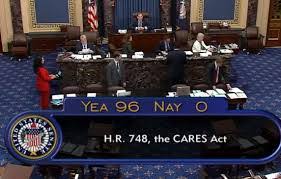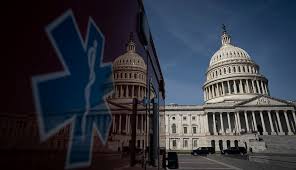Congress Enacts CARES Stimulus Act

Congress enacted the largest economic stimulus bill in history, totaling approximately $2 trillion to protect US families and businesses from massive economic damage resulting from the COVID-19 pandemic. Copy of CARES Act HERE.
The package includes:
- $454 billion in loans and guarantees to businesses
- $349 billion in small business loans
- $32 billion in loans and guarantees to airlines/ air cargo
- $301 billion direct aid to households
- $250 billion in direct aid to state unemployment insurance
- $221 billion in tax deferrals and extended deadlines
- $29 billion in direct payments to airlines/air cargo
- $150 billion in direct aid to states
- $117 billion to hospitals and veterans care
- $25 billion to public transit systems
The bill expands unemployment insurance to cover freelance, gig workers, and supports state unemployment funds. Americans will receive checks of $1200 with adjusted gross income up to $75,000 for individual and $150,000 for married couples, along with $500 for each child.
With respect to the $500 billion in corporate aid which will be used to support and extend Federal Reserve loans, the new law placed controls on the money by creating a new special inspector general and an oversight board to monitor the aid.
The corporate aid includes $17 billion for assistance to companies crucial to national security. Air carriers and cargo companies will receive grants of $25 billion and $4 billion, respectively.

For healthcare providers, $100 billion will be made available through a new grant program, and an additional $16 billion for stockpiling medical equipment. The new law expands telehealth, increases Medicare reimbursement for doctors and hospitals, and delays Medicaid cuts to hospitals.
Democrats insisted on a provision that bans any businesses owned by President Trump, the vice president, members of Congress and heads of executive departments from receiving any funds or loans from the stimulus bills.
The legislation specifically addresses risks of fraud, waste and abuse. Section 4018 creates a Special Inspector General for Pandemic Recovery for five years to conduct audits and investigations relating to loans, loan guarantees and other investments made by the Treasury Department and the overall management of the pandemic recovery. The Special Inspector General shall have authority to request information and, if needed, to subpoena such information.
To add to the oversight process, the CARES Act creates a Congressional Oversight Commission to focus on Treasury Department and Federal Reserve activities related to the pandemic recovery under the CARES Act. In particular, the Oversight Commission is required to focus on the effectiveness of Treasury Department and Federal Reserve loans, loan guarantees and investments in stabilizing the United States economy.

The CARES Act involves a large amount of money and, as usual, when such money is made available, there are significant risks of fraud and misuse of government funds. Both the Special Inspector General for Pandemic Recovery and the Congressional Oversight Commission are charged with responsibility to uncover fraud, waste and abuse relating to the CARES Act.















